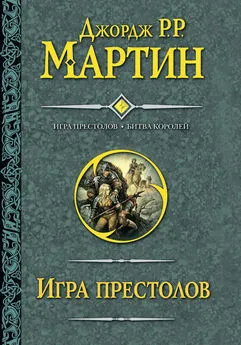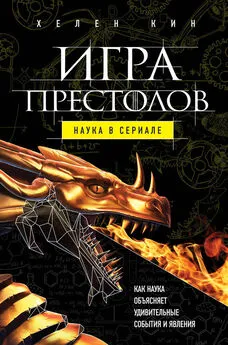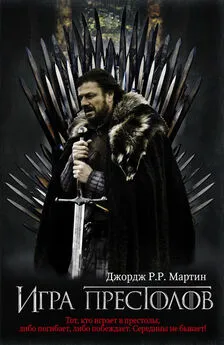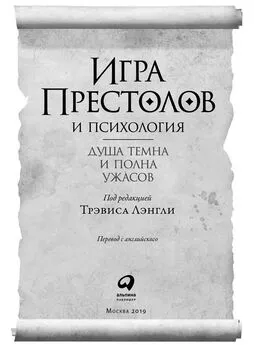Трэвис Лэнгли - «Игра престолов» и психология
- Название:«Игра престолов» и психология
- Автор:
- Жанр:
- Издательство:Литагент Альпина
- Год:2019
- Город:Москва
- ISBN:978-5-9614-2410-2
- Рейтинг:
- Избранное:Добавить в избранное
-
Отзывы:
-
Ваша оценка:
Трэвис Лэнгли - «Игра престолов» и психология краткое содержание
«Игра престолов» и психология - читать онлайн бесплатно ознакомительный отрывок
Интервал:
Закладка:
588
Баумайстер Р., Тирни Дж. Сила воли. Возьми свою жизнь под контроль. – М.: Э, 2017.
589
Там же.
590
Эпизод 1-7 «Ты побеждаешь или умираешь» (29 мая 2011 г.).
591
Denton, A. (2008, November 17). Dr. Philip Zimbardo. ABC: http://www.abc.net.au/tv/enoughrope/transcripts/s2421530.htm.
592
Allison, S. T., Goethals, G. R., & Kramer, R. M. (Eds.) (2016). Handbook of heroism and heroic leadership. New York, NY: Routledge.
593
Allison, S. T., & Goethals, G. R. (2011). Heroes: What they do and why we need them. Oxford, UK: Oxford University Press.
594
Там же.
595
Там же.
596
Милгрэм С. Подчинение авторитету. Научный взгляд на власть и мораль. – М.: Альпина Паблишер, 2018.
597
Zimbardo, P. G. (1969). The human choice: Individuation, reason, and order versus deindividuation, impulse, and chaos. In W. J. Arnold & D. Levine (Eds.), Nebraska Symposium on Motivation (Vol. 17). Lincoln, NE: University of Nebraska Press;
Zimbardo, P. G. (1971, October 25). The psychological power and pathology of imprisonment. A statement prepared for the U.S. House of Representatives Committee on the Judiciary, Subcommittee No. 3: Hearings on Prison Reform, San Francisco, CA.
598
Там же.
599
Denton, A. (2008, November 17). Dr. Philip Zimbardo. ABC: http://www.abc.net.au/tv/enoughrope/transcripts/s2421530.htm.
600
Зимбардо Ф. Эффект Люцифера. Почему хорошие люди превращаются в злодеев. – М.: Альпина нон-фикшн, 2013.
601
Allison, S. T., & Goethals, G. R. (2011). Heroes: What they do and why we need them. Oxford, UK: Oxford University Press.
602
Allison, S. T., & Goethals, G. R. (2013). Heroic leadership: An influence taxonomy of 100 exceptional individuals. New York, NY: Routledge.
603
Allison, S. T., & Goethals, G. R. (2011). Heroes: What they do and why we need them. Oxford, UK: Oxford University Press.
604
Peterson, C., & Seligman, M. E. P. (2004). Character strengths and virtues: A handbook and classification. Washington, DC: American Psychological Association.
605
Там же.
606
Эпизод 1-2 «Королевский тракт» (24 апреля 2011 г.).
607
Эпизод 4-8 «Гора и Змей» (1 июня 2014 г.).
608
Эпизод 5-5 «Убей мальчишку» (10 мая 2015 г.).
609
Peterson, C., & Seligman, M. E. P. (2004). Character strengths and virtues: A handbook and classification. Washington, DC: American Psychological Association.
610
Эпизод 3-10 «Мать» (9 июня 2013 г.).
611
Эпизод 5-2 «Черно-Белый Дом» (19 апреля 2015 г.).
612
Peterson, C., & Seligman, M. E. P. (2004). Character strengths and virtues: A handbook and classification. Washington, DC: American Psychological Association.
613
Эпизод 4-10 «Дети» (15 июня 2014 г.).
614
Эпизод 1-1 «Зима близко» (17 апреля 2011 г.);
615
Эпизод 1-4 «Калеки, бастарды и сломанные вещи» (8 мая 2011 г.).
616
Эпизод 4-10 «Дети» (15 июня 2014 г.).
617
Peterson, C., & Seligman, M. E. P. (2004). Character strengths and virtues: A handbook and classification. Washington, DC: American Psychological Association.
618
Allison, S. T., & Goethals, G. R. (2013). Heroic leadership: An influence taxonomy of 100 exceptional individuals. New York, NY: Routledge.
619
Эпизод 4-3 «Разрушительница оков» (20 апреля 2014 г.).
620
Peterson, C., & Seligman, M. E. P. (2004). Character strengths and virtues: A handbook and classification. Washington, DC: American Psychological Association.
621
Там же.
622
VIA Institute on Character (2015). Главная страница. VIA Institute on Character: http://www.viacharacter.org.
623
Эпизод 1-2 «Королевский тракт» (24 апреля 2011 г.).
624
Ebbinghaus, H. (1913). Memory: A contribution to experimental psychology. New York, NY: Columbia University, Teachers College.
625
Kelly, C., & Castellanos, F. X. (2014). Strengthening connections: Functional connectivity and brain plasticity. Neuropsychology Review , 24 (1), 63–76.
626
Эпизод 3-3 «Стезя страданий» (14 апреля 2013 г.).
627
Flynn, J. R. (1984a). IQ gains and the Binet decrements. Journal of Educational Measurement , 21 (3), 283–290;
Flynn, J. R. (1984b). The mean IQ of Americans: Massive gains 1932–1978. Psychological Bulletin , 95 (1), 29–51.
628
Trahan, L. H., Stuebing, K. K., Fletcher, J. M., & Hiscock, M. (2014). The Flynn effect: A meta-analysis. Psychological Bulletin , 140 (5), 1332–1360.
629
Schooler, C. (2007). Use it – and keep it, longer, probably: A reply to Salthouse (2006). Perspectives on Psychological Science , 2 (1), 24–29.
630
Johnson, S. (2006). Everything bad is good for you: How today's popular culture is actually making us smarter. New York, NY: Riverhead.
631
Эпизод 5-9 «Танец драконов» (7 июня 2015 г.).
632
Эпизод 1-8 «Острый конец» (5 июня 2011 г.).
633
Эпизод 1-1 «Зима близко» (17 апреля 2011 г.).
634
Green, C. S., & Bavelier, D. (2008). Exercising your brain: A review of human brain plasticity and training-induced learning. Psychology and Aging , 23 (4), 692–701.
635
Oakley, B. (2014). A mind for numbers: How to excel at math and science (even if you flunked algebra). New York, NY: Penguin.
636
Pink, D. (2012). Drive: The surprising truth about what motivates us. New York, NY: Riverhead.
637
Jenkins, H. (2009). Confronting the challenges of participatory culture: Media education for the 21 stcentury. Cambridge, MA: MIT Press.
638
Эпизод 4-9 «Дозорные на Стене» (8 июня 2014 г.).
639
Eysenck, M., & Keane, M. (2015). Cognitive psychology: A student's handbook (7th ed.). New York, NY: Psychology Press.
640
Эпизод 4-4 «Верный клятве» (27 апреля 2014 г.).
641
Mayer, J. D., Salovey, P., & Caruso, D. R. (2000). Models of emotional intelligence. In R. J. Sternberg (Ed.), Handbook of intelligence (2nd ed., pp. 396–420). New York, NY: Cambridge University Press.
642
Thorndike, E.L. (1920). Intelligence and its uses. Harper's Magazine , 140, 227–235.
643
Feist, G., & Barron, F. (2003). Predicting creativity from early to late adulthood: Intellect, potential, and personality. Journal of Research in Personality , 37 (2), 62–88.
644
Чиксентмихайи М. Поток: Психология оптимального переживания. – М.: Альпина нон-фикшн, 2013.
645
Там же.
646
Kubey, R., & Csikszentmihalyi, M. (1990). Television and the quality of life: How viewing shapes everyday experience. Hillsdale, NJ: Erlbaum Associates.
647
Чиксентмихайи М. В поисках потока. Психология включенности в повседневность. – М.: Альпина нон-фикшн, 2011.
648
Gardner, H. (1983). Frames of mind: The theory of multiple intelligences. New York, NY: Basic;
Gardner, H. (1999). Multiple views of multiple intelligences. New York, NY: Basic.
649
Мартин Дж. Игра престолов. – М.: АСТ, 1999.
650
Broca, P. (1861). Remarks on the seat of the faculty of articulated language, following an observation of aphemia (loss of speech). Bulletin de la Société Anatomique , 6, 330–357.
651
Pedersen, P.M., Vinter, K., Olsen, T.S. (2004). Aphasia after stroke: type, severity and prognosis. The Copenhagen aphasia study. Cerebrovascular Diseases , 17, 35–43.
652
Эпизод 5-9 «Танец драконов» (7 июня 2015 г.).
653
Salthouse, T. A. (2006). Mental exercise and mental aging. Perspectives on Psychological Science , 1 (1), 68–87.
654
Schooler, C. (2007). Use it – and keep it, longer, probably: A reply to Salthouse (2006). Perspectives on Psychological Science , 2 (1), 24–29.
655
Bartsch, A., & Hartmann, T. (2015). The role of cognitive and affective challenge in entertainment experience. Communication Research;
656
Эпизод 1-9 «Бейелор» (12 июня 2011 г.).
657
Maslow, A. H. (1943). A theory of human motivation. Psychological Review , 50 (4), 370–396.
658
Goldstein, K. (1939/1955). The organism: A holistic approach to biology derived from pathological data in man. New York, NY: Zone.
659
Adler, A. (1908/1959). Understanding human nature. New York, NY: Fawcett; Adler, A. (1924). The practice and theory of individual psychology. London, UK: K. Paul, Trench, Trubner & Company.
660
Adler, A. (1930). Individual psychology. In C. Murchison (Ed.), Psychologies of 1930 (pp. 395–405). Worcester, MA: Clark University Press.
661
Maslow, A. H. (1970). Tribute to Alfred Adler. Journal of Individual Psychology , 26 (1), 13.
662
Maslow, A. H. (1943). A theory of human motivation. Psychological Review , 50 (4), 370–396.
Читать дальшеИнтервал:
Закладка:









![Андрей Фурсов - Мир «Игры престолов» — это мир подлости, разврата и жестоких пыток [«Игра престолов» как проект будущего]](/books/1082346/andrej-fursov-mir-igry-prestolov-eto-mir-podlo.webp)
